news
South Arkansas Roots Bloom into a Farm Dream
While she had some childhood exposure to hobby farming and spent time on a turkey and cattle farm last year, Desiree’s true farming journey began at CAFF. She got her first taste of production-scale agriculture through her student plot and another small off-site plot she managed while in the program. “Before CAFF, I was more of a home gardener. This was the first time I could really work with production practices,” she says.
From Graphic Design to Peppers: a Journey Into Farming
Zach never imagined he’d find himself behind the wheel of a tractor or harvesting vegetables under the sun. His background was as far removed from farming as one could imagine: nearly two decades as a professional illustrator and graphic designer. He came to that career by an unconventional path.
Cultivating Connections: Finding a Place in the Northwest Arkansas Food System
Through CAFF, Maeve discovered she loves more than just the farming itself—she loves the business side too. Growing up around restaurants had given her some perspective, but seeing farming through the lens of entrepreneurship opened her mind.
Farming Dream Takes Root in Arkansas
When Ashley was 14, her family moved from a large city in Missouri to a rural town in Vermont. Ashley had no previous experience with farms or agriculture, but at the end of the school year in Vermont, she felt the land calling to her. She contacted farms listed in the yellow pages until she found a dairy farm that invited her to intern for the summer. She fell in love with farm life, and from then on, she knew some day she would own land and be a farmer.
Meeting a Farmer Plants Farm Dream in Future Chef
Jonah volunteered as a counselor at a summer camp while in high school. The grounds featured a quarter-acre garden, where they met a farmer named Doug. Jonah’s experience there was inspirational and life-changing. It lit up a new path: the love of nature, growing food, and cooking. Although that path would twist in several directions, the core passions remained. Eventually, it brought Jonah to the CAFF Farm School, where they hope to unite all three in a vision for the future.
Inspired to Farm by Local Farms
The decision to apply for CAFF Farm School was a slow realization that she’d like to learn farming. Living in apartments as an adult, she never had the space for a garden. But she had acquired plenty of experience with the local food system by working as a server at restaurants like The Farmer’s Table and at Ozark Natural Foods. While there, the employees toured local farms. She visited the beautiful Dripping Springs Garden, and the lifestyle was very appealing. It’s a bucolic farm growing flowers, herbs, vegetables, and fruit. Nicole says, “It made me seriously consider farming as a career. And farmers are the nicest people I’ve ever met.“ She decided to pursue it, but wasn’t sure where to start. A co-worker was applying to the CAFF Farm School and invited her to the Farmers For Tomorrow fundraiser. There she learned more about the program and the need for farmers. She decided
A Desire to Farm Gets an Opportunity
Keira remembers the day when she realized farm life was definitely for her. Her farm crew had been working in sweltering heat, harvesting all day to pack CSA boxes and get them out. The last task was to trellis overgrown tomatoes. There wasn’t even a path through them. It was hot, and everyone was run down and tired. They decided to put on music and then started competing over who could trellis tomatoes the fastest. Next, it began to rain, and they were all getting drenched. “It was a moment when the situation was tough, but we made the best of it,” says Keira. “That‘s when I realized that a bad day farming is better than a good day anywhere else I had worked at. It was the day I decided farming was for me.”
From an Office Job to Farming
Justin had a good job working in the family business back in his hometown of Little Rock. He wore a suit every day to the office. The only problem was that he didn’t enjoy the work; it wasn’t a good fit for him. He left the company to explore other interests. That’s where he discovered how much he enjoyed working outside. “It kind of saved me in many ways,” he says. “It was the opposite of what I’d been doing, which was indoors and often stressful.”
Finding Community and Culture Around Farming
Being half Korean greatly impacted Julia’s decision to farm and her motivations. Growing up in Atlanta, she experienced her mom’s strong Korean immigrant community as a support system and cultural conduit. The community would come together for fellowship around food. Julia and her brother were immersed in this experience as children, families coming together around a transplanted culture and its cuisine. She visited a couple of regenerative farms in California and felt a deep draw towards them. These experiences brought her to the CAFF Farm School.
Immigrant Enjoys Freedoms and Farming
“We always had to self-censor and be careful what we say publicly. I’m happy to have speech and spiritual freedom here in the United States.” In her birth country, she was an English teacher. She married a colleague, an English teacher, and a United States citizen. They returned stateside about 16 years ago. She cites the pandemic as her final motivation to farm.
A Landowner Discovers Farming Income Options
Initially, their farm was conceived as a hobby farm. However, being in the program has taught Rebecka what an asset their land is and what their farm can become with her new knowledge and skills. “CAFF’s mission is to teach people to farm profitably, and that was a happy surprise. Our intensive crop planning in class made me think about different things we could grow to earn money while the fruit trees and berries mature.”
Finding Job Fit and Fulfillment in Farming
Cubicles were never going to be a good job fit for Josh. He always enjoyed physical labor more. Being in nature was necessary, and he wanted to make a living working outside. It came naturally and felt right. He eventually found himself doing turf management in the golf course industry.
A Poet in the CAFF Farm School
Twenty years ago, when she was studying International Business, Erin couldn’t have imagined that she’d eventually become a poet farmer in Arkansas. Life can be twisty that way. With two young children, her MFA coursework, and the CAFF Farm School all simultaneously, it’s surprising that Erin has time to think. She was happy to find other artists and even a fellow poet in her cohort at the CAFF Farm School. She’s also learned about many different farms run by artists and writers who farm in the mornings and create in the afternoon.
Farmer Inspired by Mother’s Farm Memories
Marcela grew up with their mother’s shared stories of a childhood living on a farm. The anecdotes were told with tenderness and fondness, painting a mental image of a lifestyle filled with hard work and generosity. To Marcela, it always seemed like a fulfilling way to live.
Training as a Culinary Farmer
As a teen, Graham started working in restaurants and eventually attended culinary school. His culinary resume working with lauded farm-to-table restaurants is impressive. They feature locally grown produce in their creations, and some have farm managers or culinary farmers that grow exclusively for their menus.
Transitioning from Hobby Farming to Commercial Farming
Originally from Chicago, Christina moved to Arkansas thirty years ago. She met her husband, raised a family, and had a career as a scrub tech for two decades. When Covid hit, she knew it was time...
Pursuing a Farm Dream and Saving Heirloom Seeds
As a young child, Chad was drawn to farming. He remembers gazing at photos of farms as a boy and dreaming of a farm future. They were primarily images of large-scale commercial operations, which he eventually realized could be unattainable for him. Now he’s farming daily and loves working with nature. There is excitement about developing his production skills and a business plan incorporating his passion for heirlooms.
Former Hospital CEO Plans Active Retirement as Farmer
For Joe, the physical aspect of farming is a feature and not a bug. He believes active people with purpose and plenty of movement live longer and are healthier. Keeping your brain busy intellectually is essential, too. He loves to learn new things. The CAFF Farm School checks many boxes for his plan to age well. “I’m getting plenty of exercise, and I haven’t taken this many class notes since college,” he laughs!
A Focus on Farming to Feed More People
The desire to farm first sparked for Carter while spending a summer in Guatemala working at a children’s home where he helped grow food. That feeling of being able to provide people with a harvest and nourishment felt terrific. He loved it. After returning to the States, Carter wanted to continue growing food. “We all learned a tough lesson about food systems and supply chains during the pandemic. We experienced how fragile they can be. A thriving regional food system is better for everyone and the environment. It’s best to grow our food near where we eat it.”
A Chef Learns to Farm
Patrick spent his adult life as a chef and running restaurants. Like so many of us, the pandemic was life-changing for Patrick. The idea formed of a bend in his path toward chef-grown food and the myriad avenues that could open, which led him to the CAFF Farm School.
Navy Veteran Drawn to the Empowerment of Farming
Tamie finds many life applications and teachable moments in farming. It instills a sense of pride and a feeling of accomplishment. “Being a female veteran, I’m empowered by my experiences in the Navy. Farming provides that same feeling of accomplishment and empowerment. I’d love to share that with others in the future. Especially children in crisis.
Marshallese Farmer Educates Community About Diabetes and Provides Food
Lucy, a Springdale resident, is on a mission to combat these alarming statistics through nutrition and farming. Rather than selling her harvest, Lucy donates it to her local Marshallese community. She also shares pre-diabetic information, cooking tips, and farming knowledge. The farming tips are helpful since the RMI growing environment is very different from Arkansas. This presents a challenge for those trying to grow their native crops here and prepare familiar dishes after relocating. The Marshallese community in Arkansas has the disease at a shockingly higher rate of 40% compared to only 15% in the state’s general population.
Idealistic Apprentice Gets Real About Farming
Paul says he used to be idealistic about farming, with an initial interest in plants and ecology. He also strongly desired to be a “producer” in the world, rather than a “consumer”. Sustainable agriculture offered a pathway to pursue both of these interests.
Paul applied for an apprenticeship through CAFF and has just completed his second year at Dripping Springs Garden. “The first year, I came in with this idealism, thinking that I would quickly learn everything I needed to know,” he chuckles, “It turns out, there’s a lot to know.”
Infusing Farming with Culture and Community
Karen is consistently drawn to the crossroads of food, community, culture, and helping people. Farming fits right in that sweet spot, bringing her passions and superpowers together. She enrolled in the CAFF Farm School, hoping to someday develop a small farm with a commercial kitchen. Karen is on the journey now and can’t believe how much she’s absorbed and experienced.
Fayetteville Architect Learning to Build a Farm at CAFF
Jim attended the University of Arkansas, receiving a degree in architecture when the renowned Fay Jones was head of the department. He went on to establish a successful Fayetteville-based architecture firm of his own. Then, he “got a wild hair” and enrolled in the CAFF Farm School! That’s the first of several twists in this story. Sometimes an old farm can inspire new dreams.
Exploring Farming Options at CAFF Farm School
Basia loves being outdoors and cooking healthy food. “I was never one of those people who knew exactly what I wanted to do with my life. I’m still figuring that out, but farming brings together many things I love doing.” The program has given her an opportunity to explore options for building a business around her various interests.
From Steel to Farming
Retiring to farm was a trend at the CAFF Farm School in 2023. John worked for 33 years in a machine shop at Bekaert Steel, but he dreamed of farming. Growing up in rural and agricultural Riverton, Kansas, his grandfather and great-grandfather farmed. When John and his wife discovered the Center for Arkansas Farms and Food, they decided to attend one of the open house events at the CAFF Farm School. After touring the facility and hearing about the curriculum, he decided it was time to do what he really wanted to do and learn to farm.
Farmer Returns to His Roots After Retirement
Darrel was raised in a large farming family in southwest Ohio. His grandparents on both sides raised livestock or grew row crops, as did most of their twelve children. He always worked the family farms and planned to farm himself someday. As happens sometimes, that plan took a twenty-eight-year detour. Now, he is back on the road to farming with acreage in Huntsville and attending the CAFF Farm School. He’s making new plans for an old dream.
Military Veteran Merges Farming Interest with Teaching
Melanee, a military veteran, enrolled in the CAFF Farm School to develop an urban micro-farm on an under utilized half-acre on her school’s property. The project, dubbed Hide and Seek Farm, will provide learning opportunities for her young charges and nutritious food for school meals. The school currently serves organic food and places a standard grocery order each week. Melanee hopes to grow much of the school’s food in the future.
Veteran Chases Her Farm Dream in Arkansas
As a child, Rori was drawn to farming. While growing up in Noble, Oklahoma, her family didn’t farm. So, studying agriculture was never presented to her as a possibility. Instead, she went on to study art and eventually joined the Navy, serving for fourteen years. Afterward, with a child to support, she worked in the New Mexico oil fields. Throughout it all, the desire to farm remained a constant for Rori. She wanted to learn how to grow food for her family and community. This led to attending the CAFF Farm School on a Hometown Heroes Scholarship.
Farm School Student Will Grow African Vegetables in Arkansas
After coming to the States, he and his wife had difficulty finding fresh African vegetables for the traditional dishes they enjoyed eating. He conducted market research and found it a common issue among immigrants. He was excited to find the CAFF Farm School, which covered all aspects of farming entrepreneurship, including business, legal, and field production.
Arkansas Farm Expanding With Vegetable and Fruit Production
After retiring to Arkansas, a couple started a sheep farm and is now expanding into vegetable production. The female farm owner, at age 70, enrolled in the CAFF Farm School. She is now putting everything learned into practice on her farm as it expands to provide fresh vegetables for local farm-to-table restaurants.
Fourth Generation Arkansas Farmer Learns New Methods in CAFF Program
Chelsea is originally from Northwest Arkansas and grew up on a family farm. So, why apply for a farm apprenticeship program? The motivation began with her love and respect for nature. She was bothered by some changes she saw on the farm. There was bare ground in the pasture from overgrazing. The garden soil had compacted from years of tractor use. Observing these prompted an interest in learning regenerative farming methods to restore and nurture the soil. She wanted to play a more active role in improving the farmland and surrounding environment. Before enrolling in the CAFF Farm Apprenticeship Program, she was a Clinical Laboratory Scientist, working for nearly a decade in a medical lab. Chelsea was placed at the Heifer Ranch Center for Regenerative Agriculture for her apprenticeship. It’s located on 1200 acres in Perryville, Arkansas. The working ranch is a research, education, training, and demonstration site for regenerative farming.
Pandemic Urban Garden Launches a Farming Dream
After thirteen years of working as a nightclub deejay in Dallas, Jonathan discovered he wanted to farm. That drastic change in life direction isn’t quite the hairpin turn that it seems. Like many people, the 2020 pandemic hit Jonathan’s deejay career hard. During the lockdown, he started a small raised bed garden in his backyard. That’s where this story really begins.
New Farmer Hopes for an Agrihood in the Future
Luz has always enjoyed working with her hands, being in nature, and getting dirty. Farming is a natural fit. As a self-employed cabinet-maker and gardener, she continues to follow her interests in self-sufficiency by learning to farm at the Center for Arkansas Farms and Food. After completing the CAFF Farm School program, Luz would like to have a hobby farm with her husband and someday build an agrihood or be a part of one. The CAFF Farm School is an eleven-month program that teaches students to grow vegetables, fruits, and herbs on very little land with sustainable methods.
A Veteran Achieves Dream of Family Farm in Arkansas
Michael, who is currently working on his Ph.D. in business with a dissertation on Human Flourishing, says his personal mission statement is “to flourish and contribute to helping others flourish as...
Family Duo Learns Together in Farm School
Sion was born in Chicago, moving around quite often before ending up in Oklahoma for college. While there, he began working weekends and summers on a cattle farm in Seminole. The work was challenging but gratifying and provided a sense of peace in a busy world. During this time, Sion received an intriguing proposal from his father, Michael.
An Interest in Homesteading Leads to Farming
Gabriel didn’t initially think of becoming a farmer. The idea came to him while he researched his interest in homesteading and self-sufficiency. After seeing YouTube videos and reading stories online about students in the new CAFF Farm School program, he realized that he could go beyond just growing food to feed himself and his family. He could learn to farm for profit as a business.As Gabriel learned more about homesteading and sufficiency, he became increasingly interested in growing his food. Then he ran across the CAFF Farm School and was excited to discover a program in the NWA region teaching people to farm on small pieces of land, one to ten acres, and make a living from it. That’s when things clicked that he could expand his goal to feed others too.
Gabriel researched the CAFF Farm School more, and the stories on the website about students in the program spoke to him. His only hesitation in signing up was that he had never liked school in the past. “It doesn’t feel like school, though,” he says, “I love
Farmer Grows Food for Her Community and the Environment
A farm apprenticeship opportunity changed the course of Emma’s life. The Arkansan worked for a small permaculture farm in the New River Valley region of Virginia. She apprenticed in Maine for a year with WWOOF. All of this led to the decision to pursue farming as a life direction and to apply for the CAFF Farm School. Emma most loves the slow lifestyle and fresh food of farm life. She has a deep curiosity about why and when things happen in nature. Her passion is for the protection of people and the planet.
A Farm Dream Delayed, Now a Reality
The Farm School at The Center for Arkansas Farms and Food is in its second year and already proving that farming appeals to a broad diversity of people. One student entered the adventures of The Farm School in his seventy-sixth year of life. He’s surprised everyone by physically matching his younger fellow students in physical farm work. After meeting J.R., this isn’t so surprising. He is full of life. When asked why he signed up for the CAFF program, he lists concise goals for his piece of Arkansas.
Hobby Farm Interest Leads to Farm Apprenticeship
The CAFF program matched Jeffrey with an apprenticeship opportunity at Appel Farms in Springdale. Jeffrey likes that he stays busy and has learned a lot. He thinks he still has more to learn. One of his favorite things about farming is that every day is different, even if he’s doing the same things.
An Artist from New York Learns to Farm in Arkansas
How does an artist in New York City end up as an apprentice on a farm in Arkansas? For Emilia, it began with inspiration from her grandfather’s backyard garden. Later, a friend who stayed at an intentional community inspired her to pursue a desire to get back to what she considered the “source’ of life and have a closer relationship with soil and food. She wanted to provide nourishment for herself and others.
Developing a Farm Venue
About sixty miles east of Fayetteville is the small Arkansas farm town of Alpena, population 397. A little northwest is Berryville, population 5,550. These are the two communities that formed and...
Slow Food Advocate Learns Farming
India’s had a hobby garden to feed her own household, but wanted to do more. There was a desire to be a more significant part of the local food movement that she believes in. That’s what brought her to the CAFF Farm School. It was an opportunity for learning to produce food more efficiently to feed herself and the community. India’s mother was a Slow Food advocate and passed that along to her daughter.
Farming for Food Equity
When Andie Kate talks about farming, it’s evident that this is someone who passionately believes in helping people and improving lives through nutritious, fresh food. She comes to farming with her own spin on it and well-defined goals. She is also part of a growing number of females entering what was once a predominantly male profession.
Returning to the Farm in a New Way
For some, farming is the family business. Each new generation is encouraged to farm on the family land. A young person must make the sometimes heart-wrenching decision to stay on the farm or leave for a different kind of life. It’s an old story, one we’ve all heard many times before. The tale is classic Americana.
Female Farmer Helps Marshallese Community Fight Diabetes
Lucy has a heart for the Marshallese community in northwest Arkansas. She also has fresh organic vegetables for them. Lucy is farming a plot of land in Fayetteville and donating much of her abundance. She helps her Marshallese community adapt their traditional diets with local produce
Merging Farming and Culinary Interests – Frank’s Apprenticeship Story
Frank’s farming journey has twisted and turned in exciting ways so far. He is an example of someone following their convictions and passions down a road less traveled.
First New Arkansas Farmer from the CAFF Program
Alex heard about the CAFF Farm Apprenticeship program when a co-worker mentioned it. Later Alex would be the new program’s first success story, transitioning from apprentice to Farm Manager. He is now part of a new generation of young Arkansas farmers reviving
Appel Farms – An Arkansas Small Farm Experience
Picking Arkansas strawberries on a balmy spring day is a beautiful thing. It reaffirms that life is indeed good. Appel Farms has 10 acres in production, offering both strawberries and pumpkins for the picking. The old family home is now a commercial kitchen with a small dining space and a little produce shop. Appel Farms has a lot going on for a tiny little farm in the heart of a thriving, growing
Dripping Springs Garden – A beautiful CAFF mentor farm.
The drive to Dripping Springs Garden takes you through truly stunning views of the Ozarks. Once you arrive, the peace of the farm settles over you. On a recent visit, the fog of a cool spring morning nestled into the lush dark greens of the foliage. The farm is host to CAFF apprentices where Mark and Michael train a new generation of
A Farm Apprentice Story – Adam M
Adam was not born and raised on a farm. He grew up in the big city of Fort Worth, Texas. His first taste of farm life was volunteering on a friend’s urban farm there. The experience inspired a desire to become more self-reliant and to grow food. He learned about sustainable, regenerative, and bio-intensive farming. With no formal agriculture education or farm training, Adam decided that he wanted to be a farmer.
A Morning at dH Farm in West Fork
Growing up on a farm in Minnesota, Mark Den Herder was uncomfortable with the confinement style of raising pigs. He thought to himself, “I’ll never do that.” And, he hasn’t. The pigs at his dH Farm in West Fork look pretty dang happy. As do the sheep, the dogs, the plants, the chickens, and the kids. As a summer morning settles in, we get a peek at life on a small organic farm in the hills Arkansas.
USDA Funds for Farmers Organic Certification
USDA Now Accepting Applications for Available Funds to Help Cover Organic Certification Costs LITTLE ROCK, Arkansas, May 16, 2024 – Through the Organic Certification Cost Share Program (OCCSP),...
What you Need to Know Before Placing Your Seed Order
It’s time to get those seed catalogs out and start thinking about ordering seeds for the coming season! This is the time of year when hope springs eternal and all of us farmers get to dream about the bountiful harvest to come. While you’ve got seeds on your mind we wanted to write a post to mention some considerations before you place that seed order.
Cover Cropping for Soil Health and Weed Control
We previously published a blog post about how we use tarps and mulch to control weeds organically at the CAFF Farm. Another key weed control strategy for us is...
Organic Weed Control Strategies that Work
Weed control is often cited as one of the most difficult aspects of organic farming. Because of the organic prohibition on synthetic herbicides, no organic sprays worth mentioning can take care of weeds. Instead, the organic farm must rely on cultural practices such as tarping and mulching for effective weed control. But the good news is that these practices actually work! And they also help build soil quality at the same time.
Plan Produce Profit
Plan. Produce. Profit. Workshops in Arkansas Dates & Locations Below · 8:30 a.m. - 3 p.m. · Register OnlineThe University of Arkansas System Division of Agriculture and the National...
Beginning Farmer Classes 2023 – Winter Schedule
1/17/2023 Farming as a Profession The Center for Arkansas Farms and Food offers an introductory course on farming as a profession featuring farmers Adam and Melissa Millsap of Urban Roots...
Growing Greens for Profit
Greens are one of the most profitable vegetable crops for market farmers to grow, and they are a great entry-level crop for beginning farmers. Greens offer a quick turnaround and a high price per pound, meaning that a grower can churn out profits on a small piece of land. This post will provide an overview of why and how to grow greens for the market.
CAFF Student Farms Receive Arkansas Grown Grant for NWA Pilot Program
This program offers grant funding to eligible farmers in Benton, Washington, Madison, and Carroll counties who are committed to increasing capacity for wholesale fruit and vegetable production. The overall goal of the pilot program is to increase the amount of locally produced food in the four-county area.
Grow More with High Tunnels
High tunnels are essentially unheated greenhouses that small farmers have found to be especially useful and cost-effective at protecting crops from frosts and other extreme weather events. Most of the time, when high tunnels are discussed in the farming world, they are mentioned in the context of season extension, which refers to the ability to expand the window of time you can harvest crops by protecting them from frost and freezing temperatures. Like a greenhouse, a high tunnel essentially creates
New Farm Grant Program for Surplus Produce
The University of Arkansas Division of Agriculture would like to partner with Northwest Arkansas produce growers for an exciting opportunity to create value-added products from surplus produce. A...






















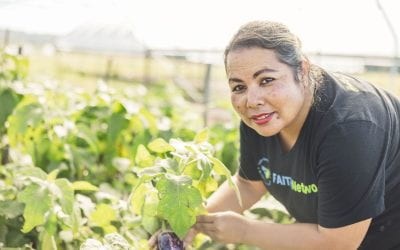
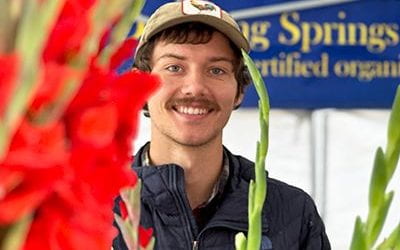
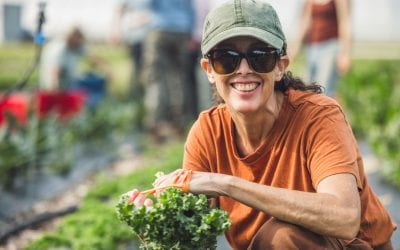

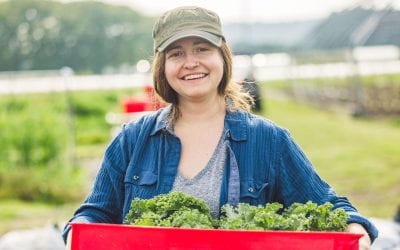
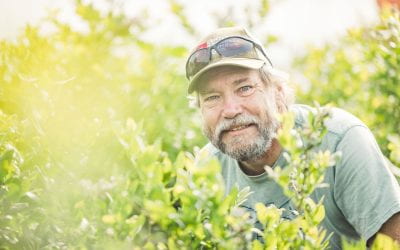
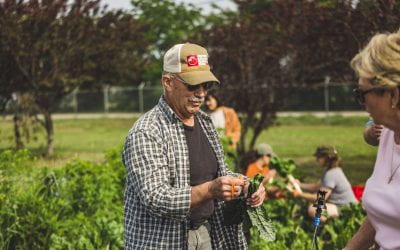
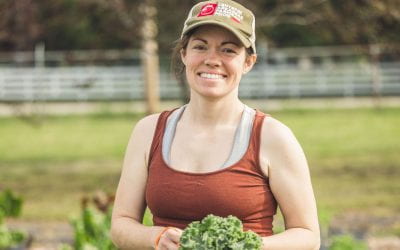
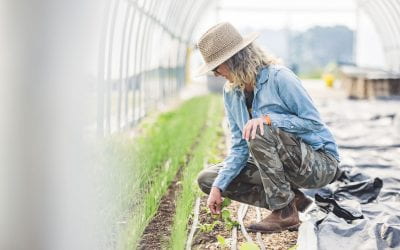
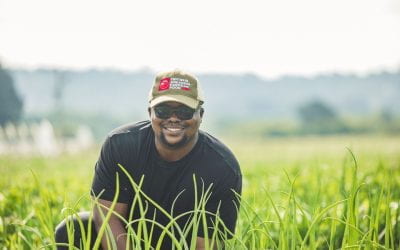
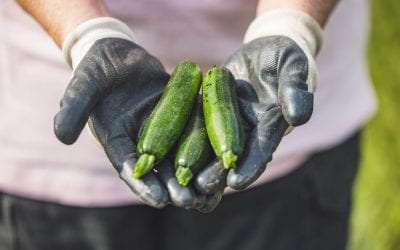
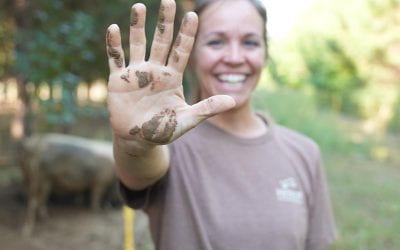
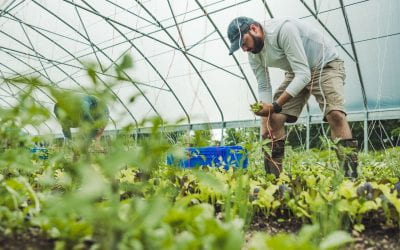
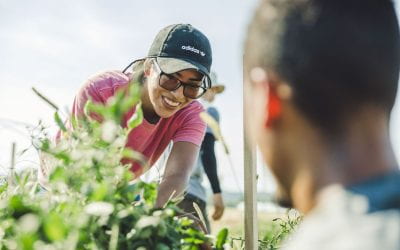
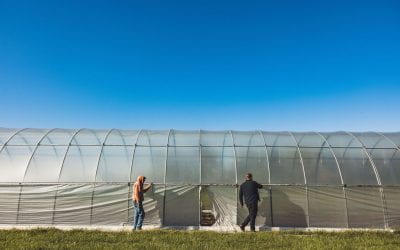
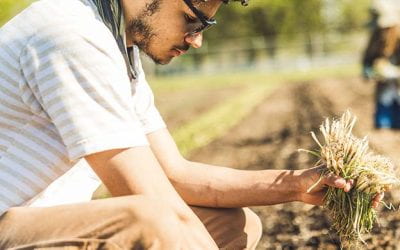
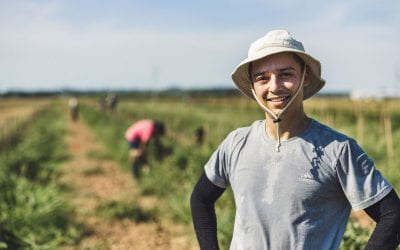
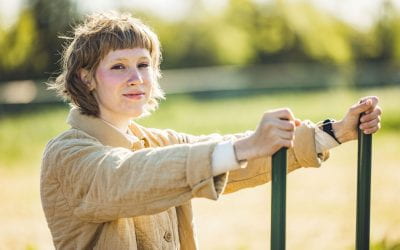
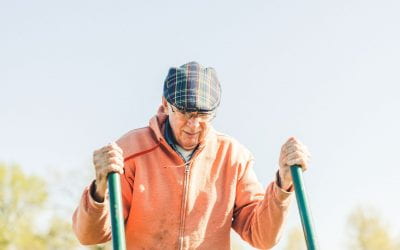
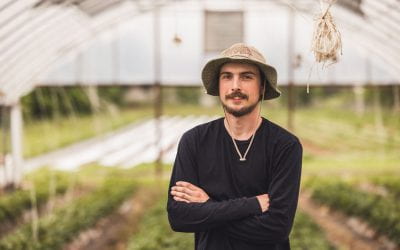
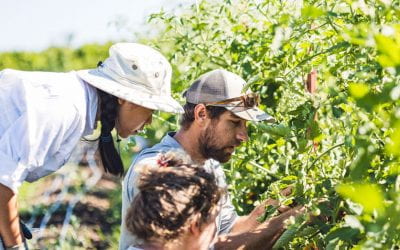
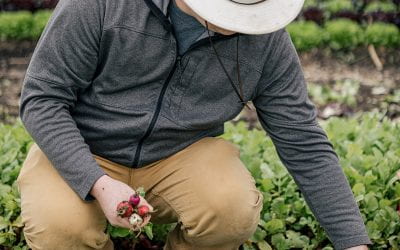
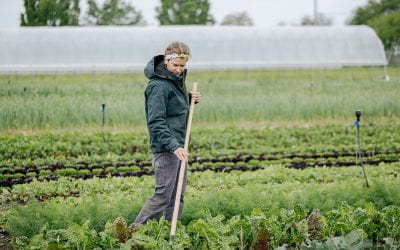

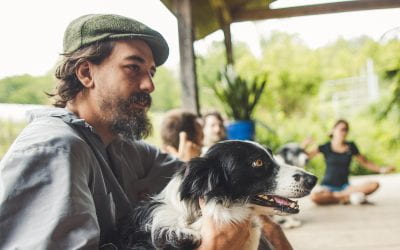
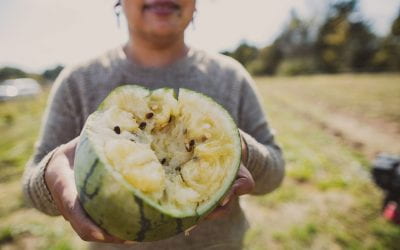
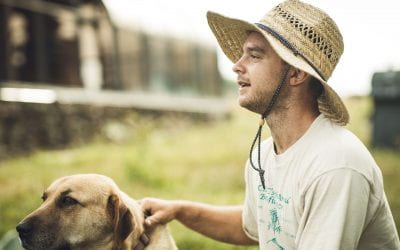
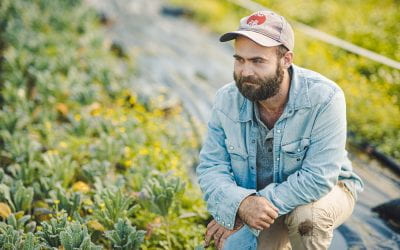
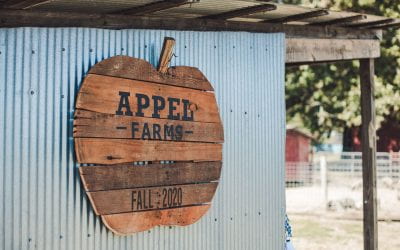
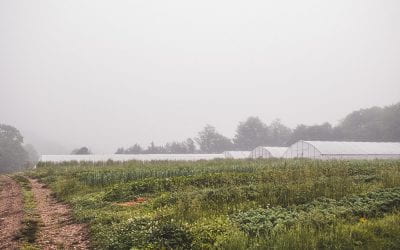

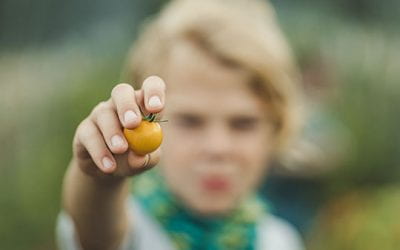
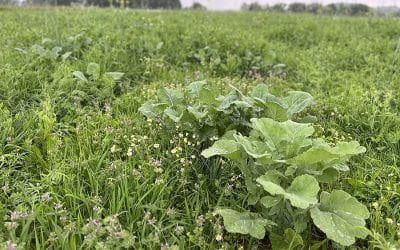
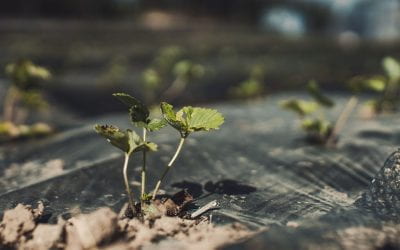
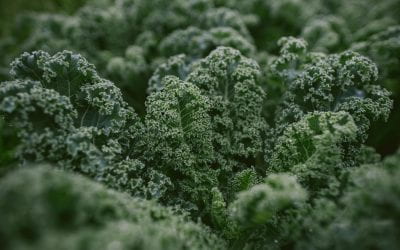
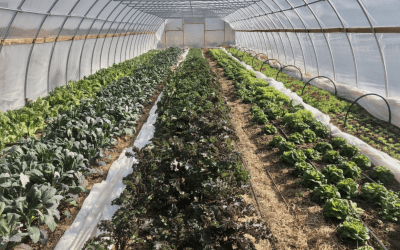
Recent Comments